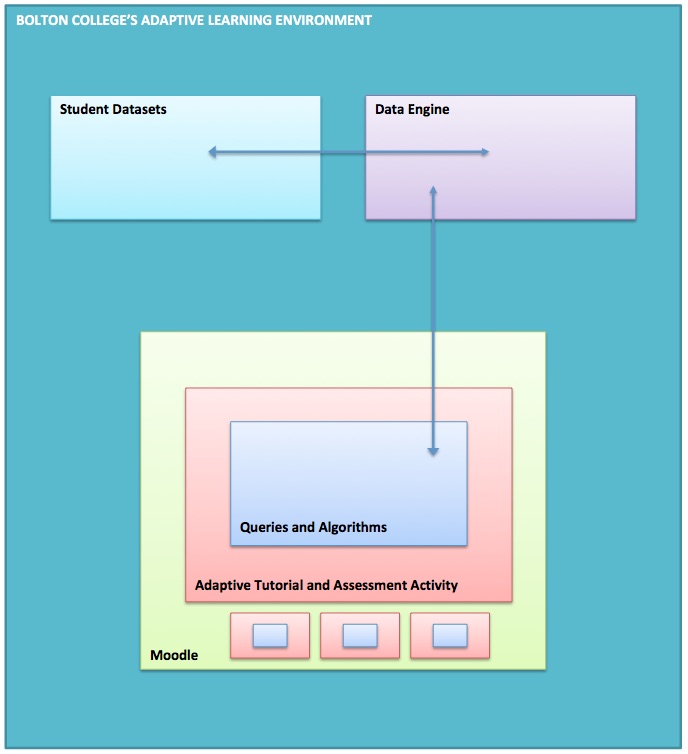Bolton College's Adaptive Learning Environment
Introduction
This short article details the four constituent parts that make up Bolton College's Adaptive Learning Environment.
- Moodle is Bolton College's Virtual Learning Environment. The research that the College's ILT Team has undertaken has enabled Moodle to deliver adaptive content and assessment activities to each student. The solution means that there is no need to purchase a license for a third party adaptive learning environment. We are planning to undertake additional research which will allow us to explore the delivery of adaptive content and assessment activities in other virtual learning environments.
- Adobe Captivate is the eLearning authoring tool which is used to create our adaptive online tutorials. Each tutorial includes a bespoke set of queries that are presented to our Digital Engine. The algorithms within each tutorial use the query results to deliver differentiated and adaptive content and assessment activities to each student.
- Student Datasets are made up of the College's core student dataset (Tribal EBS), the College's Learner Journey Management System and the student profile. At the present moment in time the ILT Team's adaptive learning project queries and analyses the data on its current student cohort. As the project progresses colleagues across Bolton College will data mine a much larger historical dataset which will deliver further improvements to our adaptive services.
- The Digital Engine reads, mines and applies updates to the wider student dataset. The present choice of name for the Digital Engine is deliberate because it reflects its current ability to behave and act autonomously. At the present moment in time the Digital Engine relies heavily on teachers and instructional designers to shape and inform its behaviour and the decisions that it makes. Over time, the Digital Engine will gradually evolve into a virtual machine which will have the ability to behave in a more autonomous fashion. That is to say that it will define, test and apply changes to its hypotheses in order to deliver improved adaptive tutorials and assessment activities to each student.
The relationship between the four component parts of Bolton College's adaptive learning environment are best presented by Figure 1 and the following scenario. A student logs into Moodle and opens a tutorial on a given topic. Before presenting the opening slide to the tutorial, the tutorial queries the Data Engine for information relating to the student. The Data Engine gathers details on the student via the student dataset which clarifies her status on the course. This may include information such as her current position on the course, previous topics covered, previous assessment results, targets, goals, learning preferences and so on. The algorithms in the tutorial analyse this data before presenting the opening slide to the student in Moodle. This process may occur once or multiple times during the course of a tutorial. Thus, the adaptive learning environment is able to deliver a differentiated and adaptive tutorial; along with differentiated and adaptive tasks, questions and assessment activities to the student.
Figure 1: Bolton College's Adaptive Learning Environment
Summary
Bolton College's adaptive learning environment is gradually informing, shaping and improving the online components of our courses. One of the early courses to take advantage of adaptive online learning and assessment is the College's employability course. Level 2 students from across the College may not even notice that their tutorials and assessment activities are differentiated and adapted to suit their individual needs and requirements; unless they peer over to their friend's laptop screen. What is important to the College is that each student is presented with a high quality tailoured programme of study which enables them to progress onto further study, training or employment.
